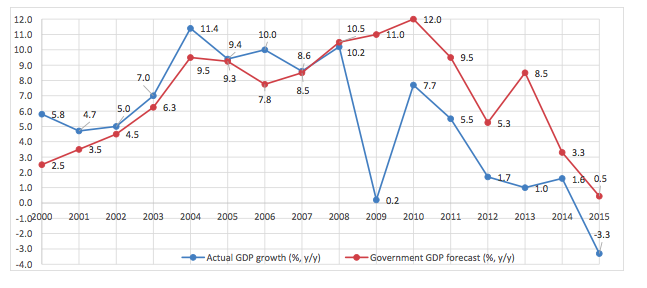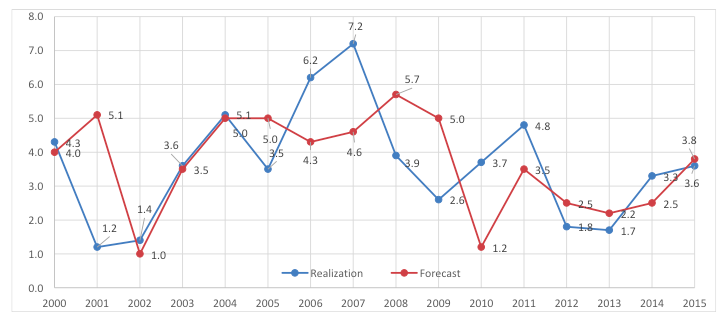Why are Belarusian economic forecasts constantly inaccurate?

According to the official Social and Economic Development Programme 2011-2015 GDP was supposed to increase by 62-68% by the end of 2015. In reality, the growth is likely to hit around 6%.
How did the government manage to get it wrong by such a large disparity?
After 25 years of transition, the Belarusian state forecasts remain unreliable. But Belarusian independent think tanks, commercial banks and international organisations also frequently overlook the real economic trends and have to revise their forecasts several times throughout any given year.
The Belarusian quasi-socialist economy is hardly suited for macroeconomic forecasting. Irrational decision-making by the Belarusian authorities and incentives for officials to polish the data hinders sound forecasting. Additionally, official statistic gathering and reporting is still in its infancy and competition between those making the forecasts is scarce.
Systematic errors in forecasting
Belarusian state-employed economists regularly fail to provide accurate predictions about the economy. They often fail to provide proper predictions even for economic growth, probably the most important macroeconomic indicator for any economy. The government's annual forecasts continuously underestimated the GDP's actual growth by almost a quarter from 2000-2006, while from 2009-2015 their figures exceeded its actual performance by almost three quarters.
In other words, in 2009-2015 official economic forecasts exceeded the true GDP's growth on average by 5.1 percentage point per year. Hence, forecasts even just the year ahead have been highly inaccurate.

Source: The more important forecast’s parameters of socio-economic development of Belarus, Decrees of the President of the Republic of Belarus (2000-2015). The performance in the first half 2015 stands for 2015.
The forecasting errors in Belarus have become even clearer after comparing them with more developed post-socialist countries. True, the annual GDP forecasts projected for Poland’s central budget also happened to miss the actual economic growth in 2000-2015.
Nevertheless, in contrast to Belarus, the margin of error was much smaller and offset one another in consecutive years. In particular, in 2009-2015 they fell in a range of -2.5 to +2.4 p.p. but their sum in the whole period was only 0.8 per cent of GDP. Neither the global financial crisis nor other external factors spoiled Poland’s governmental forecasts.

Source: Budget Act (2000-2015), Government of the Republic of Poland. The performance in the first half 2015 stands for 2015.
Frankly speaking, the poor results of economic forecasting in Belarus are also due to Belarusian think tanks, individual economists, commercial banks, and international organisations (such as the IMF or the World Bank). For instance, in the last week Priorbank, the 6th largest bank in Belarus, reduced its GDP forecast for 2015 to -3.5 percent. Yet, early this year in its first weekly economic review the bank projected economic growth at 0.5 per cent. Thus, in the absence of a war or a major natural disaster, 4.0 per cent of the GDP evaporated in less than seven months.
Unpredictable decisions of Belarusian authorities
Political discretion stands at odds with economic rationality in Belarus where state-owned enterprises (SOEs) account for 70 per cent of GDP (according to the EBRD). Belarus has a very weak market economy and whereas in other market-oriented countries an unprofitable state-run enterprise that regularly goes bankrupt would be dropped, in Belarus the authorities rescue SOEs at virtually any expense. Recently, Lukashenka ordered $0.6bn in financial aid to be sent to state automotive plants to stabilize their financial situation. Therefore, the authorities violate the very principles of economic predictability by ignoring some of the basic laws that rule any market economy.
Administrative decision-making play a bigger role in Belarus than in the average market-oriented economy. At times, it is very difficult to predict what the economically irrational choices of Belarusian authorities may be. Take, for example, the policy of raising the nominal average salary by 46 per cent over 12 months before the presidential elections in December 2010. Eventually, the officials’ continuous interference in the economy leads to macroeconomic instability.
Moreover, as Lukashenka regularly approves the official macroeconomic forecasts, state officials are encouraged to try to alter what is really going on with their statistics to make the outcomes look better than they really are. For instance, in autumn 2011 the government submitted to the President a draft forecast that had predicted 1.5 per cent GDP growth for 2012. Lukashenka’s harsh critique forced officials to promptly revise its growth forecast to 5.5 per cent but, needless to say, the GDP ended up growing by 1.5 per cent, after all.
Technical obstacles for forecasters
Technically, Belarusian statistics contain insufficient data to make accurate forecasts – relatively coherent data are available from 1995, but they cover only the last 20 years. Given this short time frame, it is difficult to determine the range and number of general business cycles that Belarus has witnessed (perhaps three of them). Moreover, during each business cycle Belarus has experienced several extraordinary events unfold such as its decision to abandon market reforms in mid 1990s, the period of generous energy subsidies in 2000s, and the 2008 global financial crisis. However, precise economic forecasting requires stable and replicable trends, something, which Belarus currently lacks.
Additionally, the Belarusian state statistical committee suffers from a low level of credibility among both Belarusian and international experts alike. This distrust stems from the data from the 1990s and the beginning of the 2000s, a period of hyperinflation in Belarus. At a relatively high level of inflation, even minor errors in calculating the GDP might lead to a serious misrepresentation of economic growth that was the result of shifts in prices rather than levels of production. In a country report from 2004, the IMF stated that the Belarusian national accounts were overstating their real growth by about 1-2 per cent.
Little competition among forecasters
Belarusian economists are reluctant to develop advanced macroeconomic models for forecasting due to the low level of competition between their counterparts to develop more accurate predictions. Very few economic units systematically produce forecasts in Belarus (the primary outlets are the National Bank of Belarus, Ministry of Economy, Ministry of Finance, IPM Research Center, and some commercial banks), but even fewer of them make their results public.
Without strong demand for sound economic forecasts and their subsequent assessment by an independent body, economists will continue to produce low-quality economic forecasts. Perhaps the National Bank of Belarus, alongside the national media, could set up and conduct a contest for the country's best macroeconomic forecasts. By drawing the attention of potential employers – be it the state ministries, businesses and think tanks – such a contest has an opportunity to attract the best economists and create incentives to improve their forecasting skills.
-
03.01
-
07.10
-
22.09
-
17.08
-
12.08
-
30.09










































